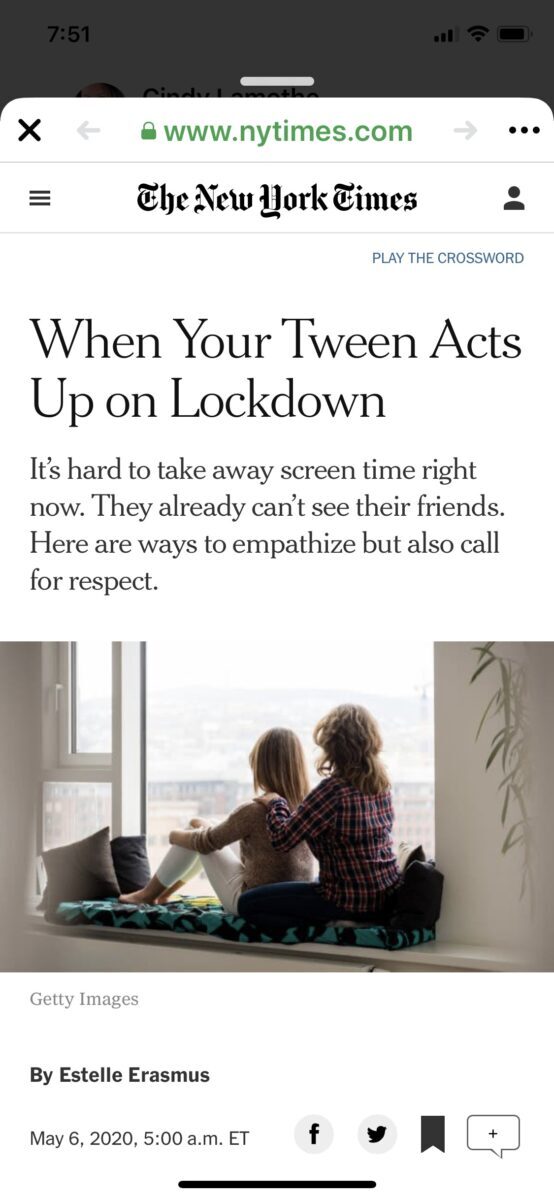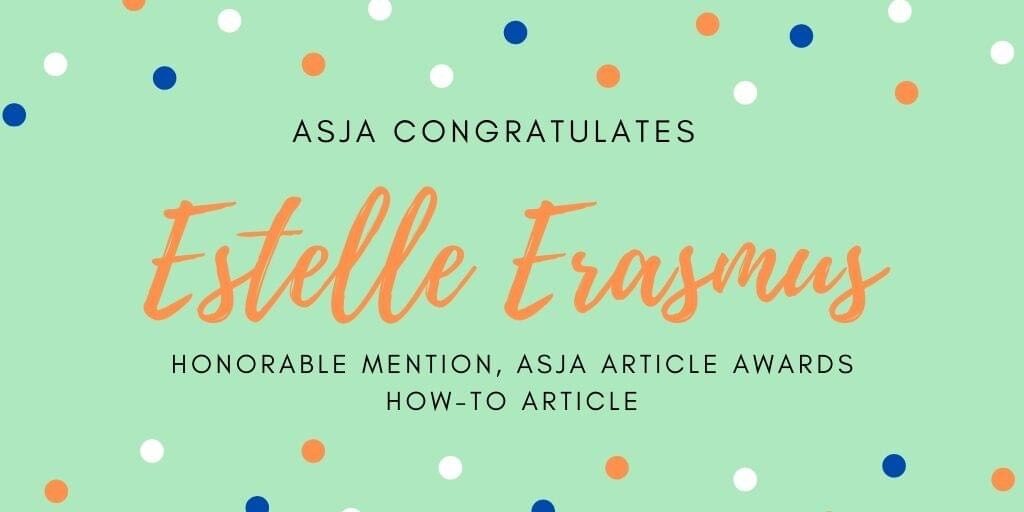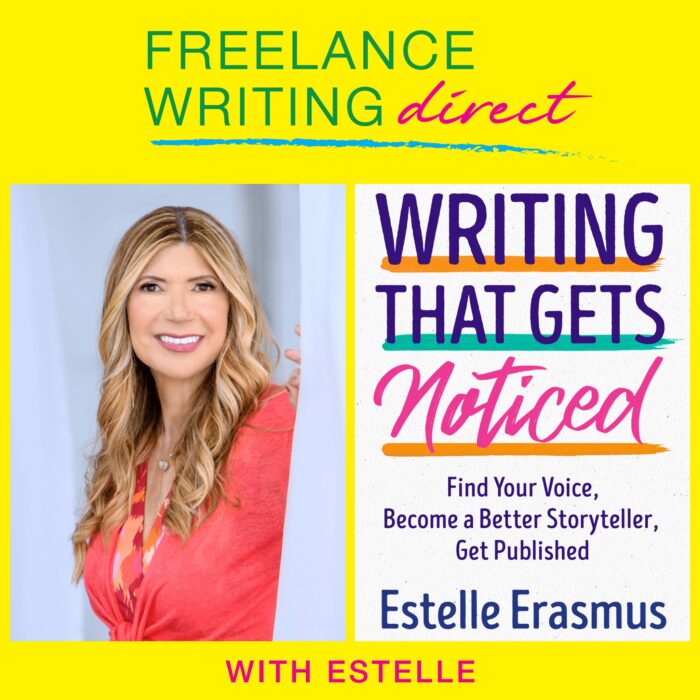First of all, welcome to my new subscribers. It’s great to have you here. You can also follow me on Twitter, Instagram and on my professional Facebook page.
I wanted to share some news:
I had my latest (3rd) parenting article published in The New York Times today.
It is all about what to do when your tweens act up while on lockdown (all of our new normals).

The article begins here..
My stuck-at-home 11-year-old spends her off-school hours on the online game platform Roblox. As screen time goes, it’s a pretty safe, kid-friendly, and creative option, since with parental controls I’m able to lock down her privacy (that means no chats, ever). She is also allowed to check out the new mod menu for Roblox to see what other ways she can play her favorite game so she is never bored, but that must be supervised too.
But she resists screen time limits, argues about getting off Roblox to do chores and tries to push her bedtime later every night. She is worried about not being able to go back to sleep-away camp this summer. And annoyed that she can only FaceTime her friends, instead of seeing them in real life.
I get it. Her reaction is understandable, considering the fraught times we are living in.
But when she gets disrespectful, I can’t go to my usual set of consequences like threatening that she won’t be allowed to attend a friend’s birthday party, or being sent to her room (which is now her sanctuary). All the usual punishments are off the table when everyone is already essentially grounded.
Following are some experts’ suggestions on how to handle conflicts with tweens during lockdown.
Read the entire article here .…
Also, I won an award from The American Society of Journalists and Authors for my article that went viral for The New York Times last May “How to Bullyproof Your Child”. I am truly honored. Thank you.
The award says:
ASJA2020 Writing Awards congratulates Estelle Erasmus for Honorable Mention in the How-To-Category: “How to Bullyproof Your Child” by Estelle Erasmus in the New York Times.
WHAT THE JUDGES SAID: Using what happened to her child and herself many years before, Erasmus finds a method that not only disarms bullies but helps children become independent thinkers, capable of tackling problems by themselves.
“How To Bullyproof Your Child:

You can also read my article for The New York Times What To Do When Your Tween Is Trash-Talking You” here.
Pitching Is Fun-damental
I had a fun pitching Zoom call with Tim Herrera (Smarter Living editor for The New York Times-find him on twitter at @TimHerrera aka Internet Person) along with Laura Norton, Deputy Editor for In Style (dot.com) (@inLauraswords). My twitter handle is @EstelleSErasmus.
Here are some of the key tips I shared, which you will also find in my pitching course for Writer’s Digest (where I work with you on pitches one on one). I also cover pitches in my course for NYU Writing Parenthood (which sold out in the Spring–now I have a class for summer filling up now).
I had made a few notes before I got on the call and here I’m sharing them.
Pitch Tip 1:
Write to the Reader: Juli Fraga wrote a piece for Narratively called “Music Saved My Life“, and her pitch enthralled me because it brought me into the story. With permission from Juli, here is her pitch.
“I have a pitch for Narratively: “Music Saved My Life: How Sound Healing Helped One Woman Recover From Trauma,” as ‘as-told-to’ story about the psychological benefits of sound healing, and how it helped one woman heal from trauma.
Here’s the pitch:
The concert arena vibrated from the sound of the bass and the heavy beat of the drums. “Suddenly everything has changed,” sang Wayne Coyne, lead singer of the rock band, “The Flaming Lips.” Fans screeched with delight as they danced along to the music.
When Jacqui McLoughlin heard these lyrics, the music moved through her body. Her chest tightened, and a tingly sensation tickled her throat, pushing painful emotions to the surface. Tears fell from her eyes, but instead of feeling sad, she felt cathartic.
“I was in a meditative state; it was the first time I’d released emotion since my friends and loved ones had died.”
Most people attend rock concerts for entertainment, but McLoughlin went seeking salvation. Months prior, three devastating losses had upended her life. Talk therapy was futile, which led her to try the type of healing we’ve used for decades: music therapy.
While it might sound unconventional, people have been using music as a form of medicine for centuries, and studies suggest that sound healing can help lesson stress, anxiety, and even boost the immune system. With mental health care costs rising, sound healing could be an accessible and cost-effective treatment for those suffering from post-traumatic stress disorder, depression and grief.
In an ‘as-told-to-‘ format, I’ll tell the story of a trauma survivor and artist/musician, Jacqui McLoughlin and how attending the Flaming Lips concert led her to study sound healing-a type of music therapy shown to help people recover from trauma, anxiety and depression.
May I write this story for Narratively? I’ve written essays for The New York Times, The Atlantic City Lab, and most recently Audiofemme.
Thanks for considering my submission.
This is a perfect pitch in so many ways.
You see what she did? The concept is to write the first paragraph of your pitch as if the editor was reading the first paragraph of the story. In other words, gear your pitch to the publication’s audience. Other ways to elicit an editor’s interest: start with a dramatic anecdote, compelling (or even scary) statistics, an intriguing quote from an expert, or a vivid, action-packed description (like Juli’s).
Also, since so many of you have asked: when you pitch me for Narratively where I’m an ongoing guest editor (see the pieces I’ve edited here to get an idea of what works), remember the focus is the extraordinary stories of ordinary people. Read the pub, at least read the stories I’ve edited. Think of highly unusual situations (jobs, experiences) that up the drama quotient. And remember, we don’t focus on breaking news, but we do want evergreen (aka timeless) stories. Pitch me at estellewriter (at) aol.com (and it is just for pitches) and put Narratively Pitch and your title in the subject line.
Pitch Tip 2:
Purport to Pre-Report:
People ask me about pitching to The New York Times, and I always say that you should do your due diligence and make sure you have new, fresh information on the subject matter you will cover. That goes for any place you are pitching, including Narratively. If you can share it with the editor, they know you will be able to share it with readers in a deeper fashion.
Pitch Tip 3:
Follow The Five W’s:
I always tell my writing and pitching students to always include The Who, what, when, where and why. Think grade school and make sure that what you are saying is clear.
Pitch Tip 4:
Titles Should Tantalize:
I’ve written about this a lot before, particular for Writer’s Digest, but have a catchy title in your email submission line that gets me or an editor excited. So write Submission or Pitch: And then Catchy Title.
Pitch Tip 5:
Play Nice with Editors
Look, editors are people, too, and many of us write just as much as we edit. So, be nice and if you love something we write or edit, share our stuff on social media and tag us when you do.
Pitch Tip 6:
Write Op-Eds If You Want to Be Timely
At this point, most essays and articles are not exactly timely, especially if you are focusing on life during lockdown which has been the same for oh about six weeks now. But, you can write short op-eds (slices of life and opinion) and get them published in most publications fairly quickly. The key is to write it at no more than 700 words.
Teaching News
As I already mentioned briefly, I am teaching Writing Parenthood online for NYU this summer. I wasn’t planning to originally, but with quarantine and all plans up in the air when NYU asked, I said YES. I’m also teaching a class at NYU on journalism for teens for a special program.
My students have recently been published in The New York Times, The Daily News, The Washington Post, The Huffington Post, Next Avenue and more. Sign up here.

What I Wrote
I wrote My Teen Is Frozen in Place, and Momentarily Am Able To Relax for Romper
I wrote I Was Determined to Breastfeed, But Nothing Went As Planned for Ravishly.
I wrote Ava McDonald, Teen Founder of Zfluence Sells To Brands Because Her Generation (Z) Keeps Social Media Real for my column for Forbes.
I wrote Strung Out Author, Erin Khar’s Inspiring Path to Publication for my column for Forbes.
See my other Forbes columns here.
_____________________________________________________________________________
Best of luck with your writing. I am taking on a limited number of students for September 2020 (you can see my testimonials here).

